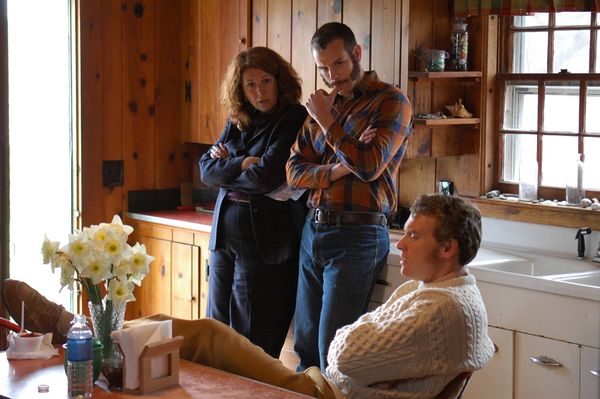 |
| Gwen Wynne on set with Tate Donovan and Adam Pascal Photo: courtesy of Global Digital Releasing |
The story of two teenage girls growing up on Cape Cod and realising that their father is in a relationship with another man, Wild About Harry is a very personal story to its co-writer and director, Gwen Wynne, who based it on her own life. Starring Tate Donovan and Adam Pascal as the couple, with Danielle Savre and Skye McCole Bartusiak as the daughters, it has also been a labour of love, as she was up against a reluctant establishment when it was first made, and although it enjoyed success on the festival circuit (under the title American Primitive), it has taken over a decade to get a proper cinema release. When I meet up with Gwen, she tells me that the story began even earlier.
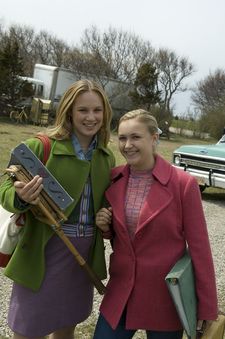 |
| Danielle Savre and Skye McCole Bartusiak as the girls Photo: courtesy of Global Digital Releasing |
“Yes, well as early as 1994, actually. When I was in film school I wanted to make it. I was trying to make it in Britain. That's a long story. There were actually a lot of people interested in it, like Ian Canning. Do you know Ian Canning? He's the producer of The King's Speech. He was at Renaissance at the time, and he really wanted to make the film. And then, for many reasons, that didn't happen. Then I brought it back to the United States, and then cast it in the United States. And what what was interesting is so many actors did not want to play a gay man. Even gay actors did not want to play them. I started casting in 2005 and the culture still wasn't very open to it. But all the agencies in Hollywood loved the script, and so I got to audition wonderful people. And then the politics of the time here made it very difficult to distribute.
“What happened was, there was no language at the time for a family gay film. And DVDs were such a big market share that places like Middle America, places like Walmart and such, wouldn't buy the film. So it's been a really long journey, and I'm just really happy that it's out.
“Also, I've been advocating for more women directing. And when you look at the statistics, how difficult it was – start from like, ‘85 to 2015, and women that made their first features had, basically, another ten years to get their next features made, if they were lucky. The statistics also bear up how hard it is for female independent filmmakers getting their work distributed. So I really had a political hot potato at the time. So that kind of explains its journey. It has been a little painful.”
I tell her that I find it interesting, because we can think about what's changed since 1973, when it's set, and the point at which she made it, but then also at what's changed between that point and where we are today.
“Yes, yes, it actually is fascinating because of that. I should write about it one day. And also, my father was still alive when I started writing it, and he was very ambivalent. And then actually before he died, he was really glad that I that I wrote it. Now, as an adult, I think, ‘Gosh, how hard that must have been for him raising us in a climate where it wasn't accepted and he was desperately afraid of my sister and I being taken away from him.’ So it's interesting because I don't know if you know, but the Catholic Church now does not allowed gay parents to adopt children from their orphanages. So the stigma is still there.”
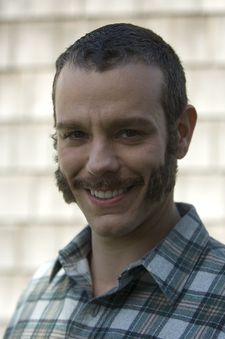 |
| Adam Pascal as Mr Gibbs Photo: courtesy of Global Digital Releasing |
How much of the film actually comes from real life and how much did she alter?
“The disco scene, I made up,” she says. “I wanted to have a big moment where Madeline discovers her father, and I thought that would be very dramatic. But what was true at the time was that as teenagers we did go to these gay discos up in Provincetown. Because you could get alcohol. In Britain you can get beer at 16, right?”
I explain that one can legally drink beer at parties and events at that age but can't get beer at a pub until one reaches the age of 18. Which is still better than 21.
“Isn't that ridiculous?” she remarks.
It seems very strange to me, I say, especially as one can vote and everything else.
“I know. It's very strange. I think it's because there was so many terrible car accidents in the, I guess it would be the Eighties and Nineties. But the drinking age was 18 when I was growing up. So let's see. I mean, what's real is there was a Mr. Phipps. In the film he’s Mr. Gibbs. He did live in the back of the house. He did make American primitive furniture and my father and Mr. Phipps partnered on on creating that business. And it actually began in the Village in New York City. It used to be called the Pear Tree Collection, and John Lennon and Jackie Onassis would buy it, so he had he had a following.”
She shows me a piece of his furniture which she has in her house, a beautifully constructed Pennsylvania Dutch cabinet.
“So let's see what else was is real in it,” she muses. “I have a sister. We were on Cape Cod. Ironically, I did not want to shoot in Dennisport. But we ended up filming in Dennis at this house that we all love to go to the summers. And this fabulous production designer who was friends with my production designer, she said ‘I have the perfect house for you.’ I mean, that house is amazing. That house was the perfect place. So that really was a great set for us. Right on the cliff, and it's gorgeous. I mean, it's one of my most favourite beaches in the world. So basically, what I've said is that the emotional truth of the movie is real. And I've fictionalised part of the story. My grandparents did not take us away. I know that there was that threat at the time.
"My grandparents aren't alive anymore so I can say that they were thinking about it. And so I utilise that in the story. When I was doing research there were many children that were taken away from their parents by their grandparents. I wanted to tell the story because I had never seen anything from a girl's point of view, growing up in a gay household. You usually see it from the parents’ point of view.”
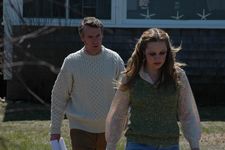 |
| Harry tries to explain Photo: courtesy of Global Digital Releasing |
I suggest that her framing helps people to understand the issues more as they realise that homophobia also affects those close to its direct targets.
“It affects everybody,” she agrees. “Because it's when two people aren't allowed to share their love. I mean, it's a tragedy. It really is. And then when you have to hide it, it really is a tragic. So wrong.”
Does she feel that things are better, overall, these days?
“I'm so happy that gay marriage is legal,” she says. “I think that's been a huge change. I think that at least in the major cities, people are a lot more open – or maybe people are silencing themselves – but I think it's much more acceptable. And I think the gay movement and their campaigning have really, really made a difference. I think that educating people more about it is really important.”
I note that there are a lot more LGBT stories available in mainstream cinema now, just as there are a lot more female directors. Does she see herself as somebody who helped to change things like that?
“Oh, absolutely,” she says. “That's been my career. Actually, I've been very active in the Women's Committee and in different movements. Vanity Fair took a photograph of all these women, and I was in that photograph, we were part of this group working just to change the needle so that women were directing more, and they are – I mean, it's amazing. There's a whole new generation of younger women that are breaking through. And one of the big things that has happened that the Women's Committee at the Directors Guild of America has done is that we were able to pass through that all the studios had to sign, on their contracts, that they needed to create programmes to educate women and minorities for their shows, because they would say ‘Oh, well, no, there's enough depth of talent to direct our shows, we can't find the people.’ And then we just said, ‘Well, just create the training programmes.’
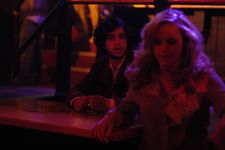 |
| Panic at the disco Photo: courtesy of Global Digital Releasing |
“I'm really proud of all the work. It's many, many women fighting together to really change things because it was pretty awful. And the sexual harassment was pretty awful. To experience that, you know – I’m sure every single woman has. So yeah it's made a difference. We really tried to advocate for younger women in different areas to break in. Because all the all the departments, production design and cinematography are still tough, there are not a lot of women. That's changing, it is changing. It's for the good. So I'm very happy about that.”
Does she think that it also sent a message to actors who were nervous about playing gay roles, to see that the stars of Wild About Harry went on to have successful careers?
“Yes, yes, I do. And Tate and Adam are so amazing. And every actor that was in this was It meant something to them personally, too. And that was what was also so beautiful about all the actors in the show.”
There’s wonderful chemistry between them. Was that something that developed spontaneously?
“I think it's partly my directing,” she says. “And I think also they had good chemistry, and they're also wonderful actors. So yeah. And I have to say, I love Tate. I mean, this is from a director's point of view. Tate takes direction really well and he's a really wonderful, dedicated actor. I mean, all of them are. They're all wonderful. And Danielle gives a remarkable performance. I mean, she really wears her heart on her sleeve, and she was only 18 when she did that role.”
Then there’s the other major character in the film – Cape Cod itself.
 |
| Meet the grandparents Photo: courtesy of Global Digital Releasing |
“ I wanted to shoot there because the light is so different there, because of the ocean on both sides of the peninsula,” she says. “And it was very important to me that the character of Cape Cod has an incredible spirit. There is no place really like it in the United States. We know, historically, there has been so much, you know, Native Americans taken advantage of etc., but it was a place of enlightenment. Actually slavery was illegal in the 1700s on Cape Cod. It was also the seat of a lot of the Independence movement from Britain. So it was a very radical place, and it's interesting that Provincetown became a haven, a really a safe place for gay people to go to. It has a fascinating history.”
Whilst we’re in conversation, I also take the opportunity to ask her about her current project, MOST SECRET: AM 0017 The Greatest Espionage Story Never Told.
“Yes, I'm doing a documentary series,” she says. “It started on an agent who was an Arctic explorer, and he became one of the first commander commandos and special operations executive officers. Winston Churchill had a secret secret army, I'm sure you've heard about it. There was a movie recently that came out that dealt with the women. So since about 2003, I've been chasing the story, and also figuring out why this very dedicated, loyal soldier kept all of his records, because it was illegal to keep all of these secret papers. His daughter has kept all of his papers and revealed them to me and they were all in suitcases and in files.
“I started talking to people at MI6 and former secret agents from World War Two and none of them kept their records as they were supposed to burn them all. And I started chasing. Why? Why would he keep them? And the more I interviewed the secret agents, the more sad, tragic stories came out where women secret agents were used as decoys and sent to their death on purpose to divert the attention of the Nazis. There’s just many, many things that went on and also, one of the secret agents who is no longer alive, he wrote a book, basically characterising Churchill as a gangster. And it's in French, and in England it was never published.”
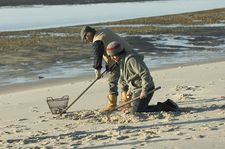 |
| Making a living on Cape Cod Photo: courtesy of Global Digital Releasing |
We break for a moment as she moves upstairs to avoid the noise from people who are doing renovation work on her home, and she chances upon a painting of her sister and herself which Mr. Phipps once gave to her father for Father's Day. As I admire it, she tells me that through the process of researching her new series, she made another extraordinary discovery: that both her grandparents were secret agents.
“My British grandparents are in the American archives, but not in the British archives,” she says. “So it began to explain a lot of things because my grandparents were sent, in ’37, to South America. And they were trained in Spain, and then they were sent to Jamaica in ‘44. So I've written it based on true story, The Lady And The Spy, which is about my grandmother and her best friend who was black Jamaican, who brought independence to Jamaica. And King George V actually knighted Lady Allen's husband, Herbert Allen. And I've created this story about these two couples, and they help in winning the war because the Nazis were going to use Jamaica as a launching pad to invade South America and North America. And so the story begins with these two women secret agents fighting the Nazis and getting them out of Jamaica.”
It sounds fascinating. When can people expect to see this?
“In 18 months, if I have my druthers, or two years if it takes that long to get the ball moving.”.
We’ll look forward to it.
Wild About Harry is in US cinemas now.





















